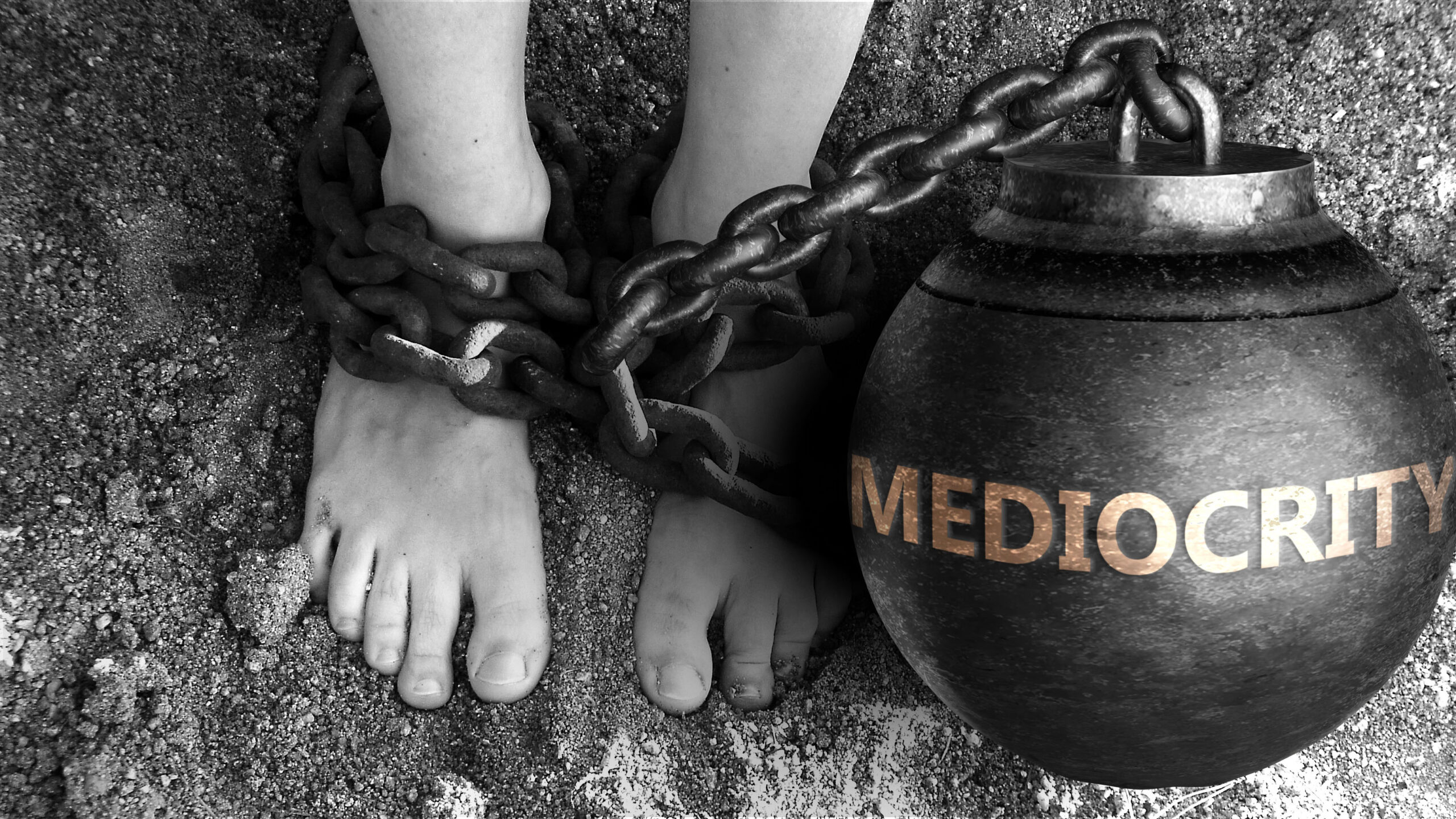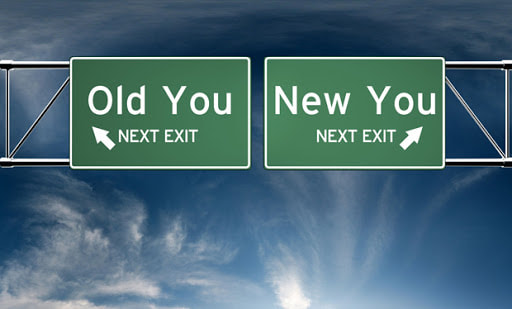Settling for “good enough” instead of what you really want? Getting comfortable with the ordinary? Letting others treat you poorly? Suffering through a poor work situation? Tired of working with people who don’t want to excel or don’t share your values? Playing small, even though you know there’s something bigger possible for you?
Time out. This is your life. Your one and only life, with an uncertain duration and no guarantees. Time to take it back.
“There is no passion to be found playing small—in settling for a life that is less than the one you are capable of living.”
-Nelson Mandela, former president of South Africa
Tired of Settling? Why Do We Settle?
If you’re settling, you’re not alone. It’s a common trap. There are many reasons we settle:
1. Fear
We’re afraid of looking bad, of not living up to expectations, of failing. We fear what other people will think or say. So we let these fears box our choices, keeping us squarely in the safe and conventional spaces even though we long for something more. The kicker is that we’re often misreading people and conjuring scenarios of their disappointment and rejection when in fact they’re not even thinking of us, or they have a wildly different take. Too often, we’re just listening to phantom voices in our head whispering about unlikely worst cases.
“So many of us choose our paths in life out of fear disguised as practicality.”
-Jim Carrey, actor, comedian, writer, producer
2. Self-Deception
We’re brilliant at hiding the truth from ourselves. We rationalize: It’s only for a while. What choice do I have? In these excuses, we hide from the distressing realization that we’re settling for something less than desirable.
“The worst of all deceptions is self-deception.”
-Plato, classical Greek philosopher
3. Conformity
We yield to parental expectations, social norms, and conventional paths instead of blazing our own path. We worry about the harsh judgment we think may come if we stand up or stand out, so we shrink back into the facelessness of the crowd. Sure, there’s safety in the crowd. But also boredom—and regret.
4. Inertia
Change is hard. We get stuck in the quicksand of questions: What to do instead? How to decide? How to make it work? Can I really give up the safety of what I have now? The “switching costs” (of changing jobs, careers, degrees, locations, etc.) can be high—especially in the short term, with no way to know the long-term payoff. So we stick with a lesser path because it’s easier to stay the course. But at what cost in terms of lost opportunities and sense of pride and satisfaction for testing our mettle and venturing forth into the terrifying beauty of possibility?
“Never be passive about your life… ever, ever.”
–Robert Egger, social entrepreneur, activist, and author
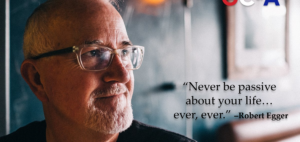
5. Not tending to the fire
We’re all born with a zest for life (see how babies and children experience the world) and a capacity for dreaming big (go back and visit your childhood dreams). These aspirations require energy, but too often we’ve let that energy fizzle out over time by burying ourselves in busywork, escaping into mindless distractions, numbing ourselves, and making excuses.
There are indeed big obstacles. Not all are fortunate enough to have choices, or a savings cushion, or the ability to escape poverty, financial insecurity, or other debilitating hardship. But these questions are relevant to all, regardless of circumstances, because even in the hardest circumstances we have agency and possibilities for change, whether by hard work, grit, adjusting our approach, or upgrading our skills and outlook.
Often the real issue is lack of clarity about what we want and how we can move forward in the face of uncertainty. Trepidation about being who we really are. Setting the bar low so we won’t be disappointed if we fail to reach it. We lack a clear and compelling why. We have no audacious aspiration to rekindle the fire.
That’s not all. More things contribute to settling:
- We avoid difficult tasks or conflicts
- We’re too busy reacting to events instead of driving them
- We lack confidence about our abilities and prospects for success
- We’re not seeing the big picture and get caught up in the moment
- We put things off until later
The Flip Side: Dangers of Not Settling?
Let’s pause here and note that there’s a danger of taking this line of thinking about not settling too far. We can get so focused on striving for something better that we lose our capacity to be grateful for what we have now. Also, we can get caught up in obsessively chasing success due to an unhealthy need for validation and recognition for achievements.
There’s a danger to some of swapping a life of settling for a life of anxiety and workaholism, detached from family, friends, health, and the simple pleasures: nature, hobbies, quiet time. We can risk losing our capacity for quiet reflection, mindfulness, and pausing for renewal. We should be wary of getting too caught up in “climbing mode.”
Ceaseless and obsessive striving can prevent us from living a full life with a healthy array of meaningful aspects, like marriage, family, career, health, friendships, community, and more. In his book, On Settling, social philosopher Robert E. Goodin notes that if we settle on some things, we’re better positioned to concentrate on others that are more important. Otherwise, our efforts may be too diffuse and never gain traction.
We can have bold aspirations for a better future but still be grateful for what we have and not too attached to a future outcome that’s unlikely to solve everything in our life and bring us unending joy. Life doesn’t work that way. Writer Chris Guillebeau creatively flips the script from the “pursuit of happiness” to what he calls the “happiness of pursuit.”
So yes, we mustn’t turn our striving into a compulsive crusade. But for many, the bigger danger is settling.
The Icarus Deception
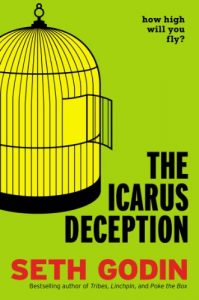
The myth of Icarus is relevant here. You may recall the warning Daedalus gave to his son, Icarus, after constructing wings from feathers and wax to escape Crete: “Don’t fly too close to the sun.”
The big danger is hubris, right? Of having the sun melt your wings of wax if you get too full of yourself and fly too high.
But author Seth Godin points out that Daedalus warned Icarus first of the danger of complacency—the danger of flying too low such that the damp sea affects his wings and causes him to crash into the water. The first danger is about flying too low. We must guard against that too.
So what to do?
Tired of Settling? How to Stop
Tired of settling? There are several things we can do to stop settling and reignite the flame in our life and work:
1. Take full responsibility.
Be a “LIFE Entrepreneur,” taking ownership of your life, and recognizing your agency. Take your life back. Stop making excuses. No one’s coming to the rescue. LIFE Entrepreneurs don’t just live: they lead a life. They don’t sit around waiting for a lucky break. LIFE Entrepreneurs create opportunities. They go after their dreams and bring them to life, and they develop a vision of the good life, devise a plan for how to attain it, go for it, and check their progress along the way. As with any great effort, their work is never done but ever-evolving and, often, inspiring to those around them.
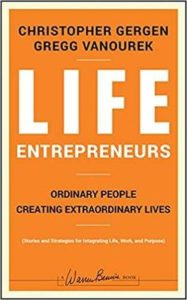
2. Summon the courage to try.
Act in spite of your fears. That of course sounds easier than it is in practice. How to punch through the fear? It helps to realize that most fears are phantoms, unlikely to play out in real life like the nightmare in our head. Also, be sure to account for the cost of coming to the end of your life and looking back with regret for not trying. It also helps if you do what’s next on the list below, to give you a sense of drive and direction:
3. Develop a clear and compelling personal purpose, values, and vision.
This will ensure that you’re clear about where you want to go in your life and work, and how and why:
- Purpose: why you’re here, and what gives you a sense of meaning and significance—including by serving others
- Values: what’s most important? What are your core beliefs and principles that guide your decisions and behavior?
- Vision: what you aspire to achieve in the future, and what success looks like for you
4. Start.
Get momentum by trying things. Learn what works (and what doesn’t) and notch small wins. Use this to build toward taking massive action.
5. Build vitality.
Develop physical, mental, emotional, and spiritual health, wellness, energy, and strength. Be intentional about nourishing habits, rituals, and routines, with visual cues to remind you about what to do and where and when. Choose intentionally what you do, with whom, and what you consume. Eventually you become the kind of person who doesn’t settle without having to think about it so much.
6. Let go of limiting beliefs.
Change your mindset. Upgrade your mental operating system. How? Spend time with people you admire. Read books that challenge and inspire you. Take courses that help you develop new skills and abilities. Listen to uplifting podcasts. Work with a mentor, coach, or therapist to shed vestiges of the past that no longer serve you.
7. Set and maintain high standards for yourself.
As with our children, we tend to rise or fall to the standards we set. Set deadlines. Focus on results. Hold yourself accountable. Be systematic about learning, development, and continuous improvement. Be clear about the kind of life you seek and commit to it. Choose the life you want, and then get to work crafting it with a hopeful and determined heart.
Temperature Check: Tired of Settling?
How’s your fire? Is it burning hot, lukewarm, or flaming out? If you’re settling, resolve to do what you can with what you have to start turning up the heat.
Reflection Questions
- Tired of settling? Are you settling in any important aspects of your life (family, health, career, etc.)?
- If so, what will you do about it? When and how?
- Who can you ask for help?
- What works for you when it comes to reigniting the flame?
- What are you waiting for?
Tools for You
- Traps Test (Common Traps of Living) to help you identify what’s getting in the way of your happiness and quality of life
- Quality of Life Assessment to help you discover your strongest areas and the areas that need work and then act accordingly
- Personal Values Exercise to help you clarify what’s most important to you
Related Articles
- Time to Check the Path You’re On?
- Taking Stock of Your Quality of Life
- Breaking the “Trance of Unworthiness”
- Getting Good at Overcoming Fear
- Golden Handcuffs—Stuck in a Job You Don’t Like?
- The Mental Prisons We Build for Ourselves
- The Trap of Deferring Dreams and Postponing Happiness
- The Trap of Caring Too Much about What Other People Think
- Are You Drifting through Life?
- Are You Getting Complacent? 17 Signs
- The Power of Taking Full Responsibility for Your Life
- The Incredible Benefits of Being Action-Oriented
Postscript: Quotes on Settling
- “It is remarkable how easily and insensibly we fall into a particular route, and make a beaten-track for ourselves.” -Henry David Thoreau
- “Too many of us are not living our dreams because we are living our fears.” -Les Brown
- “If you decide to live in the arena, you will get your ass kicked. You can choose comfort, or you can choose courage, but you can’t have both.” -Brene Brown, researcher and author
- “The secret of man’s being is not only to live but to have something to live for.” -Fyodor Dostoevsky, Russian novelist and philosopher
- “There are people who put their dreams in a little box and say, ‘Yes, I’ve got dreams, of course. I’ve got dreams.’ Then they put the box away and bring it out once in a while to look in it, and yep, they’re still there. These are great dreams, but they never even get out of the box.” -Erma Bombeck, American writer
- “We have been raised to fear the yes within ourselves, our deepest cravings. And the fear of our deepest cravings keeps them suspect, keeps us docile and loyal and obedient, and leads us to settle for… many facets of our own oppression.” -Audre Lorde, American writer, feminist, and civil rights activist
- “We ask ourselves, ‘How am I to be brilliant, gorgeous, talented, and fabulous?’ Actually, who are you not to be? You are a child of God. Your playing small doesn’t serve the world. There is nothing enlightened about shrinking so that other people won’t feel insecure around you. We were born to make manifest the glory of God within us. It is not just in some of us. It is in everyone. And as we let our own light shine we unconsciously give other people permission to do the same. As we are liberated from our own fear, our presence automatically liberates others.” -Marianne Williamson, spiritual teacher and author
+++++++++++++++++
Gregg Vanourek is a writer, teacher, TEDx speaker, and coach on personal development and leadership. He is co-author of three books, including LIFE Entrepreneurs: Ordinary People Creating Extraordinary Lives (a manifesto for living with purpose and passion) and Triple Crown Leadership: Building Excellent, Ethical, and Enduring Organizations (a winner of the International Book Awards). Check out his Best Articles or get his monthly newsletter. If you found value in this article, please forward it to a friend. Every little bit helps!

